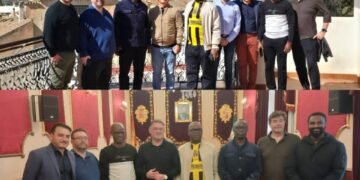In 2016, I wrote an article, ‘When will ‘Servants of God’ stop preying on women and children? Five Lessons from the ‘Reverend’ Kingsley Ezeugo Saga’. Almost on a daily basis, there are reports about religious leaders abusing members of their congregation. This problem is a global one, and has been around for a long time, considering the volume and frequency of cases involving young boys and their priests in the Catholic church for example. Some of the relationships involving religious leaders and their flock that have ended up as public scandals appear to be consensual in nature, however, there is a limit to how we can extend that argument because where there is power and authority concerned, consent becomes rather problematic. Sadly, the majority of the reported cases are simply about abuse of position, faith, trust and authority.
The sheer number of cases is alarming and the impunity with which the so-called leaders carry out their abuse is a serious cause for concern. These are the five issues I raised in my article three years ago, though this is a slightly revised and abridged version.
Our religious leaders should prioritise the need to address violence perpetrated against people in their congregation.
The majority of cases we get to hear about concern women and children, though we have also heard cases of men used as slaves in the business empires of their leaders and sometimes estranged from their families who get taken over by leaders of the church. ‘Pastor defiles 13 year Old’, ‘How my Pastor raped me’, ‘How my Pastor had sex with me to drive evil spirits from me’, ‘”It is the work of the devil”, says Pastor who raped 5 year old’, the headlines now seem to be endless. It is not enough for our religious leaders to say ‘This can never happen in my church’. When they adopt that kind of attitude, what happens is that when such a case is indeed reported in their church, they do all they can to cover it up. When confronted with a case of sexual abuse in his church, a famous church proprietor allegedly said,’ What happened to you happened in the house of God, which means God is aware. If it had happened out in the world, it would be very bad, but because it happened in the house of God, it is okay’. People go to church to seek refuge in God’s grace and love. They ask for God’s protection from the travails of life, and to be strengthened in the spirit to be able to face all their challenges. When the men and women who God has entrusted with the responsibility of caring for his flock become the abusers, then we have a serious crisis. It would be helpful if religious bodies could develop self-regulation policies to address questions such as How do people become Pastors? What modalities are in place to deal with complaints from the congregation? ‘What happens when the leader is the alleged perpetrator? ‘We have many progressive, dynamic male and female Christian leaders. They need to break the culture of silence around these issues and take decisive action.
2. Religious leaders should stop preying on vulnerable women and children
A lot has been written about how many of our ‘big’ churches have become serious business conglomerates. One of the key strategies here is a simple ‘Bums on Seats’ one. The more the flock, the greater the profits. However, competition for flock is fierce. Like business enterprises who thrive ‘in the world’, branding, innovation, entertainment and ‘shock and awe’ feature regularly. So we set the scene for a grand revival/deliverance event, an average ‘Angela’ starts to convulse in front of the Man of God, and as if on cue, gasps out certain details of what she has done and who she has done it to. She is a witch! The confession takes place, she is ‘delivered’ of her demons and the audience is convinced not only of evidence of her witchcraft, but that they have made the right decision to worship there. Everyone is reminded of all the witches in their family, village and workplace who are holding back their progress. Maybe if they pray hard enough, those witches too will pitch up here and confess. More prayers are needed. Followed by more donations. This exploitation of vulnerable, gullible women plays out around the world. In Kenya, a deranged ‘Pastor’ sucks the breasts of his female followers to ‘take away all their troubles’. In South Africa, another demon in a cassock feeds his followers live snakes. On a beach somewhere in the Caribbean, another ‘Pastor’ is pictured kissing the naked backsides of spinsters in his church searching for husbands!
We need to address our capacity to manage mental health issues in Nigeria
Our healthcare systems are always overstretched. For many years now, there has been occasional reference to the dearth of qualified personnel and institutions to provide a range of services to ensure mental health needs are addressed. What we have now is a system that classifies people into two categories – the ‘mad’ people (the ones roaming the streets or those in designated mental health institutions) and the ‘normal’ people, which is everyone else! Experts in mental health issues have told us consistently that these classifications are very dangerous and unhelpful, but we do not seem to be listening. For those who do not understand (or are in denial) about mental health issues, or those who simply cannot afford any other kind of care, they turn to religious institutions for ‘deliverance’. This only tends to further stigmatise and traumatize victims. Of course faith has a key role to play in healing, but it should not be at the expense of orthodox medical intervention.
People need to be more careful in their quest for salvation.
I do not want to blame those who turn out to be the victims, but we need to be more vigilant in our choice of how and where to worship. Many a charismatic leader has led their congregation straight to hell. The 1978 Jonestown massacre in Guyana of 908 church members led by Jim Jones and the 2000 ‘mass suicides’ led by Joseph Kibwetere and Credonia Mwerinde of the Movement for the Restoration of the Commandments of God (MRTC) in Uganda are just two examples. The challenges of religious indoctrination and brainwashing are universal as seen from the examples above. In our communities here, when we consider the levels of poverty, desperation, predisposition to superstitious beliefs, levels of education and the inability of our governments to address citizens’ needs, we should not be surprised when people create alternative avenues for succor. We should also understand how the faithful in some churches often get confused about who God really is – the one in heaven or the one here on earth who they can see? In their religious institutions and leaders, some of them find the employment, healthcare, education, counselling and support that they need. And sometimes it comes at a very high price. I am aware that discussing these issues with friends and family members can be problematic, but we should try and use whatever platforms we can to warn people of the dangers of blind faith in man and not God. Many parents have endangered the lives and well-being of their own children by placing them in the hands of some of these dangerous ‘Men of God’
Our law enforcement officers, and the judiciary, have a key role to play in protecting citizens.
We know that there is a tendency for our law enforcement officers to baulk at the thought of bringing a ‘Servant of God’ to justice. For all you know, the officer concerned might be a member of the congregation, or his wife, his brother and so on. There are those who will remember the famous pseudo prophet ‘Jesus of Oyingbo’, who was untouchable for many years, in spite of many allegations brought against him by members of his commune, hidden away in plain sight in the heart of Lagos.
There is a sad truth that has emerged in the ways in which we worship God in contemporary Nigeria and to a large extent, the rest of the world. Today, our places of worship as Christians have become deeply polarized, with class, poverty, ethnicity, desperation, levels of education, and greed playing a key role. A religion that was built on values such as humility, simplicity, honesty, love and compassion has now spawned places where impunity reigns and the vulnerable are manipulated, abused, raped, beaten, ridiculed and even burnt to death. Let us all remember the day of judgement. We will be judged by a God who created all things in his image and not in the image of man.
Bisi Adeleye-Fayemi is a Gender Specialist, Social Entrepreneur and Writer. She is the Founder of Abovewhispers.com, an online community for women. She can be reached at BAF@abovewhispers.com













